[ad_1]
The Goryeo-Khitan War: Episode 1 (First Impressions)
by alathe
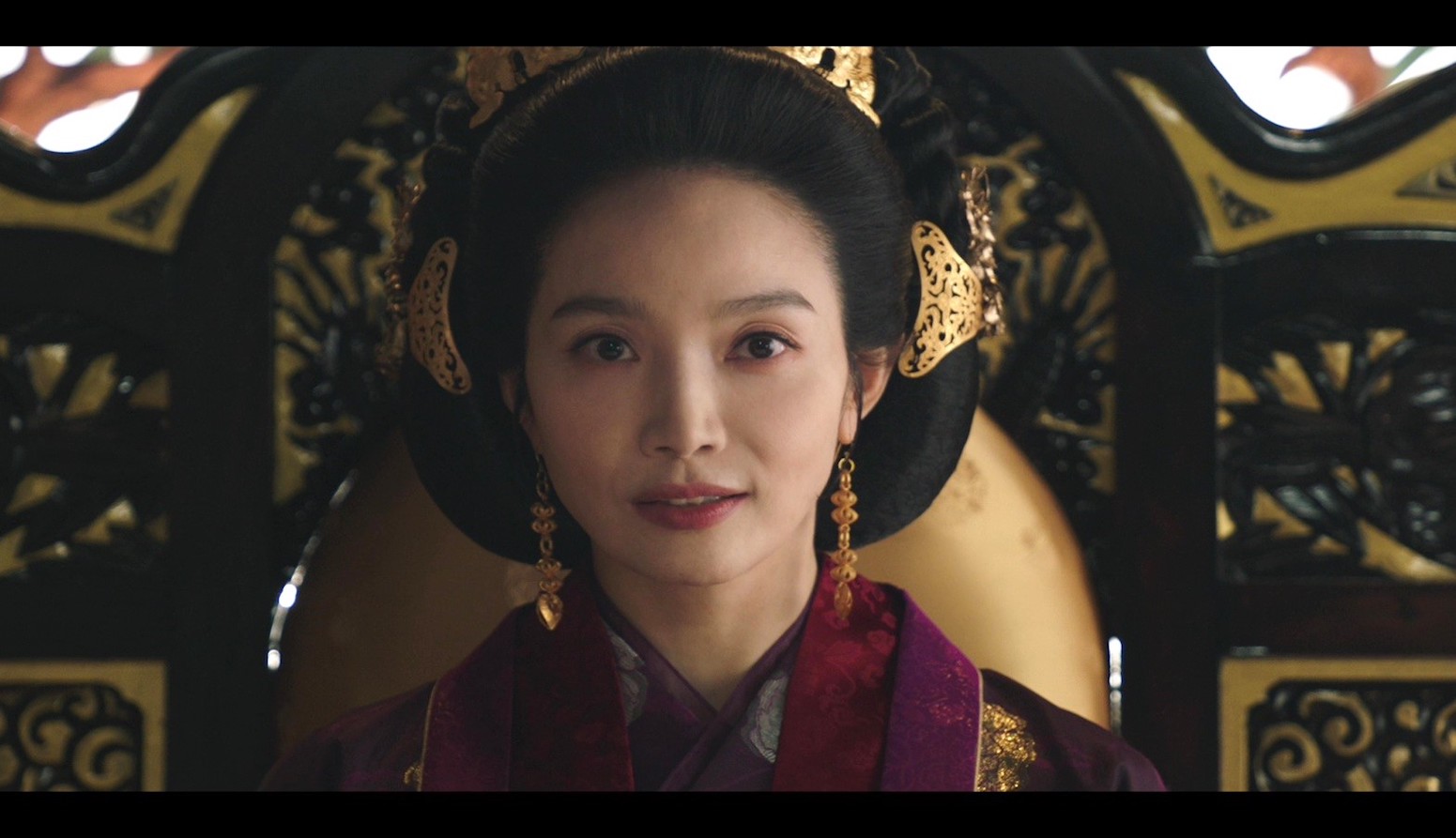
Palace intrigue! War! Multiple protagonists! The promise of ten years’ worth of political development! The Goryeo-Khitan War a is full of lofty ambitions, and already it’s off to a jam-packed start. There are plenty of things to look forward to here. But this good, old-fashioned sageuk is let down a little by its old-fashioned social mores.
Editor’s note: This is an Episode 1 review only. For a place to chat about the entire drama, visit the Drama Hangout.
EPISODE 1

We open in the ugly thick of battle. Shields meet spiked wagons in intricately-choreographed chaos, while cavalry advances. The ambitious Khitan Empire has invaded its neighbor, Goryeo, and for now, things look bleak. As attackers burst through the front line, the desperate Goryeo troops scatter. Behind the lines, their commander is implored to execute the deserters, and fast. But COMMANDER GANG GAM-CHAN (Choi Su-jong) is silent. As soldiers peel back in awe, he approaches the shield wall. Goryeo, he murmurs, will not die. Goryeo will win. He repeats it, louder. Folks, you can argue it’s cheesy, but I’m on board — we’re dealing with all the conventions of a heroic epic! The soldiers rally, forming behind him in preparation for charge.
But enough of sound and fury — we move, as is the way of these things, a decade into the past! Goryeo’s devil-may-care, hard-partying ruler, KING MOKJONG (Baek Sung-hyun), has made the palace a haven for dancing and decadence. He’s gloriously unconcerned about the lurking threat of invasion — after all, what are ministers for? He’d much rather canoodle with his lover, YOO HAENG-GAN (Lee Poong-woon) — a man whose silent, calculating glances suggest a wealth of political ambition.
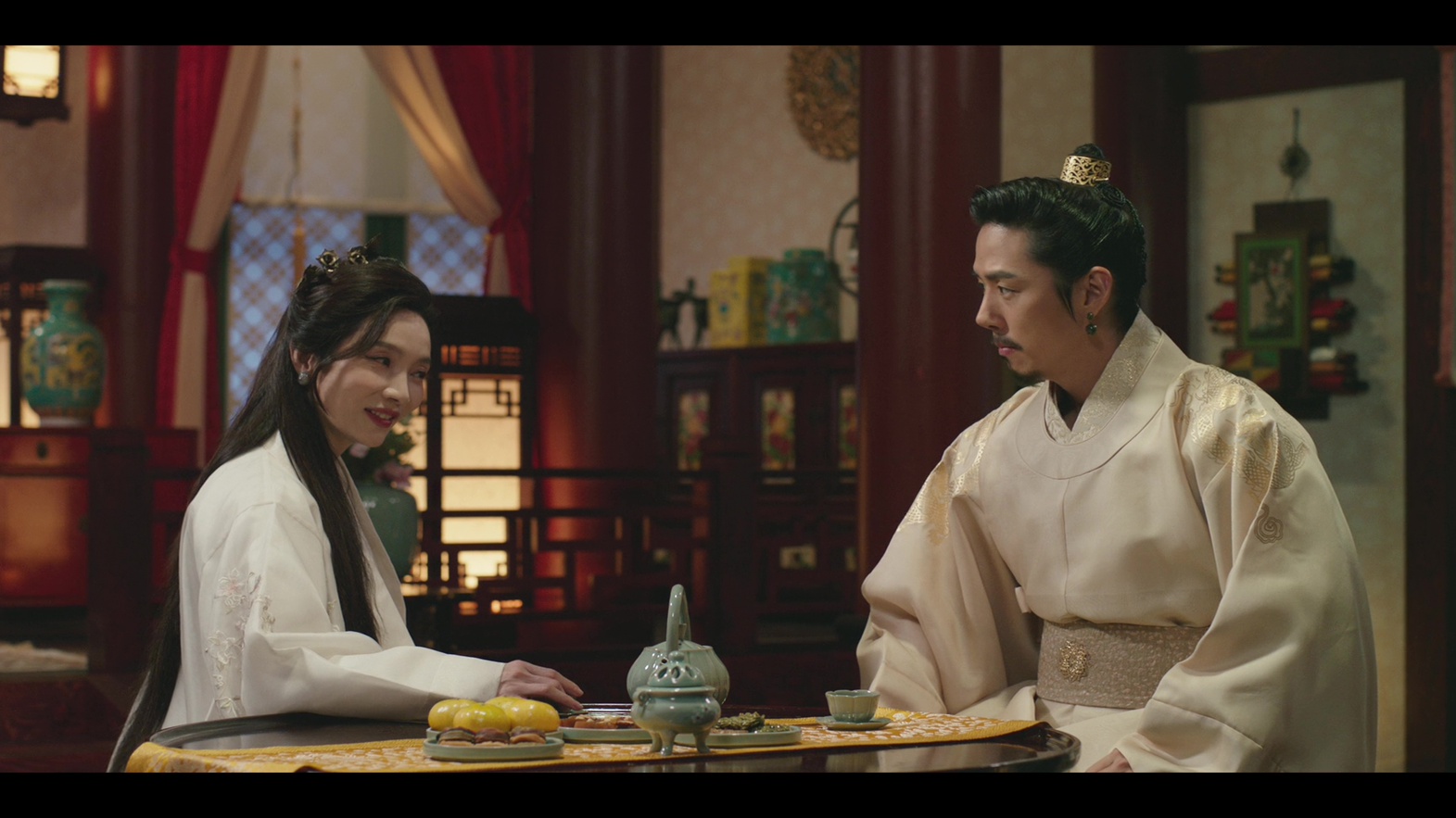
There’s one responsibility our king can’t evade: the messy business of naming an heir. His mother, the formidable DOWAGER QUEEN CHEONCHU (Lee Min-young) tells him as much, with a mixture of fondness and venom. Our wayward queen is betting on her younger son, whom King Mokjong cannot bring himself to regard as a brother. After all, the child in question was fathered by the queen’s lover, and thus not of the Wang line. But one person is. PRINCE DAERYANGWON (Kim Dong-joon), child of Cheonchu’s sister, was banished to a monastery years ago — and King Mokjong’s only leverage is to threaten to bring him back. At this, there’s murder in his mother’s eyes.
What a convenient pivot to introduce our second protagonist, Prince Daeryangwon himself! That said, it’s not immediately obvious we’re dealing with royalty. The guy we see is a disaffected youngster in a monk’s garb… shamelessly downing wine. Across from him, a small boy observes with an air of profound moral judgement. Our royal rebel has a habit of sneaking out of the monastery… and it’s about to bite him. Soon, the world’s least convincing monk is set upon by a group of nearby ne’er-do-wells — who, as it turns out, aren’t your run-of-the-mill thugs, but hired assassins. However, the quick-thinking kid warns the higher-ups at the monastery, and our hero is narrowly rescued.

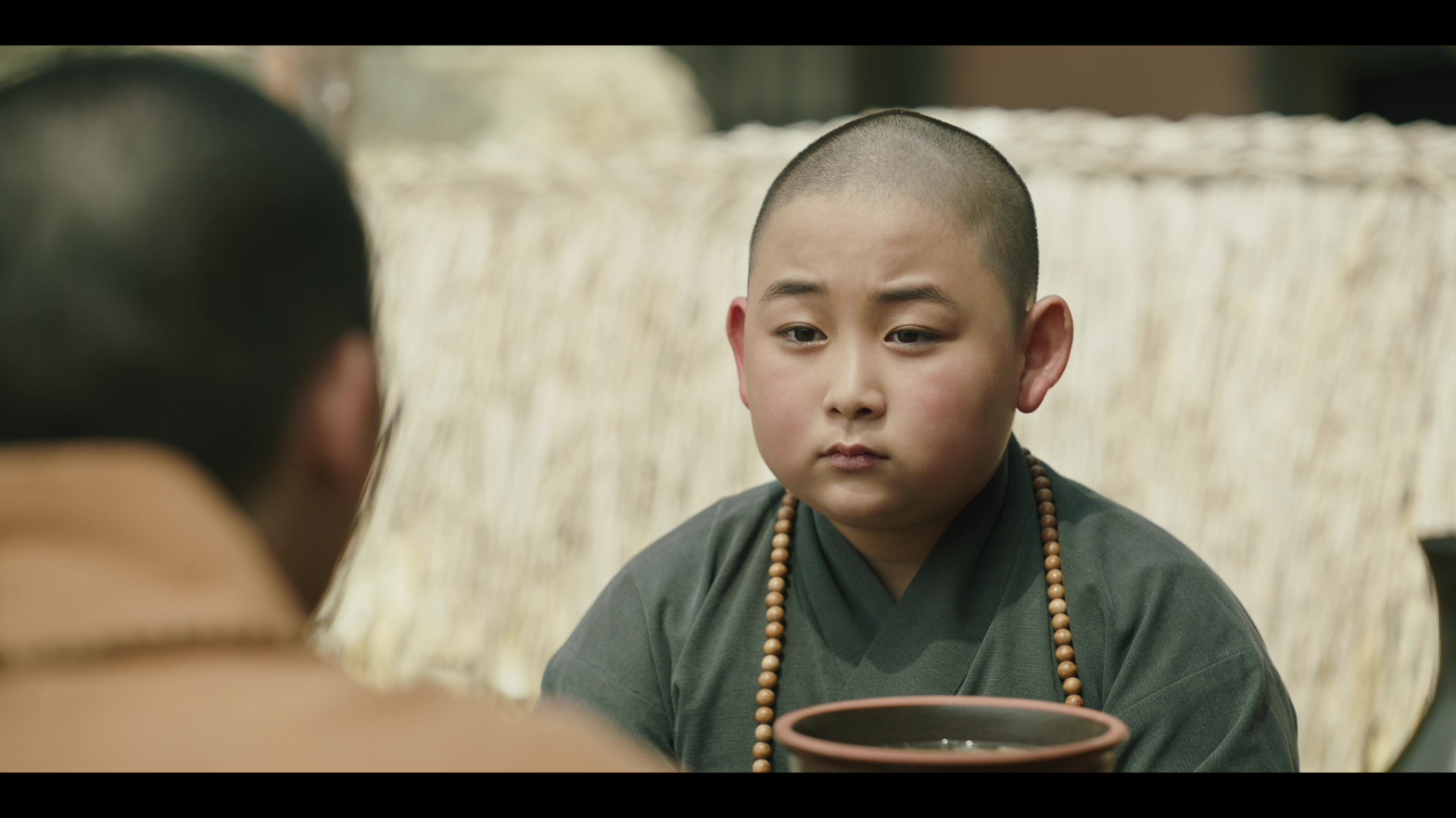
The kid receives a brutal whipping in Prince Daeryangwon’s stead. After all, no one at the monastery would dare hit a royal. Our noble hero hems, haws, and almost apologizes, much to his tiny friend’s annoyance. But Prince Daeryangwon is caught up in recollection of the one time he was whipped… by the dowager queen. Oof.
As a child, he’d flat-out refused to leave the palace — at which point, his once-loving aunt turned vicious. The only person who showed him kindness was King Mokjong. Wiping his tears, his cousin promised that one day he would ensure his return. These days, Prince Daeryangwon doubts if he’d even remember. In actual fact, with a succession crisis now in full force, King Mokjong can afford to think of little else. He’s almost about to pull the trigger on calling him back… until Haeng-gan breaks down in tears. Appoint an heir, he says, and you’ll be powerless. The court will rally behind him. I’d rather die than watch that happen.
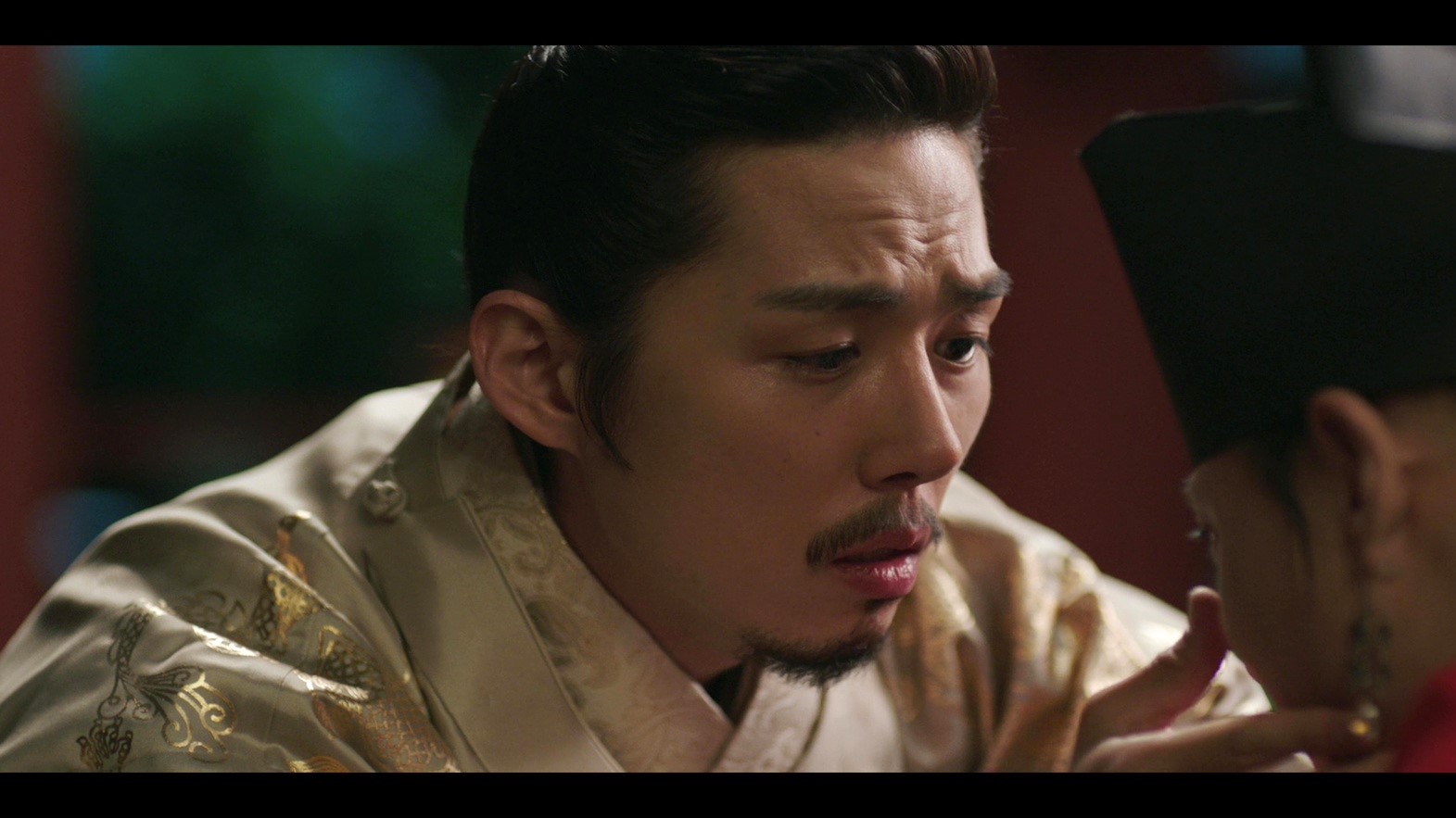

Meanwhile, far from the palace and its labyrinthine politics, trouble is brewing at the border. Temporary Government Officer of the Northwest, KANG JO (Lee Won-jong) finds himself adjudicating a skirmish between a Goryeo soldier and some Khitan scouts. All signs point to imminent invasion. Whilst his allies insist there’d be little justification for this, the governor is not so optimistic. Power, he declares, is its own justification. (Nice line!) At the end of the day, the winners make the rules. Meanwhile, there’s little expectation of aid from the palace; both king and dowager queen, they say, are too wrapped up in their respective lovers to govern.
Perhaps. But Dowager Queen Cheonchu is a skilled multi-tasker — she has plenty of time to plot a good murder or two! Soon, her court ladies and a bevy of armed assassins make a beeline for Prince Daeryangwon’s monastery. In the meantime, she makes waves at the court by sitting on the king’s own throne. Our nation, she informs a room full of scandalized ministers, is in catastrophe. Time and again, the king refuses to appoint an heir. And so, she won’t budge from this seat until one is named. At this, King Mokjong bursts onto the scene, demanding an end to this power play. The rightful heir, he declares, can be no-one but Prince Daeryangwon. The dowager queen’s eyes flash. Nobody knows, she says, if he is alive or dead. Tell me, your majesty — if he is dead, who else could ascend the throne but my son?
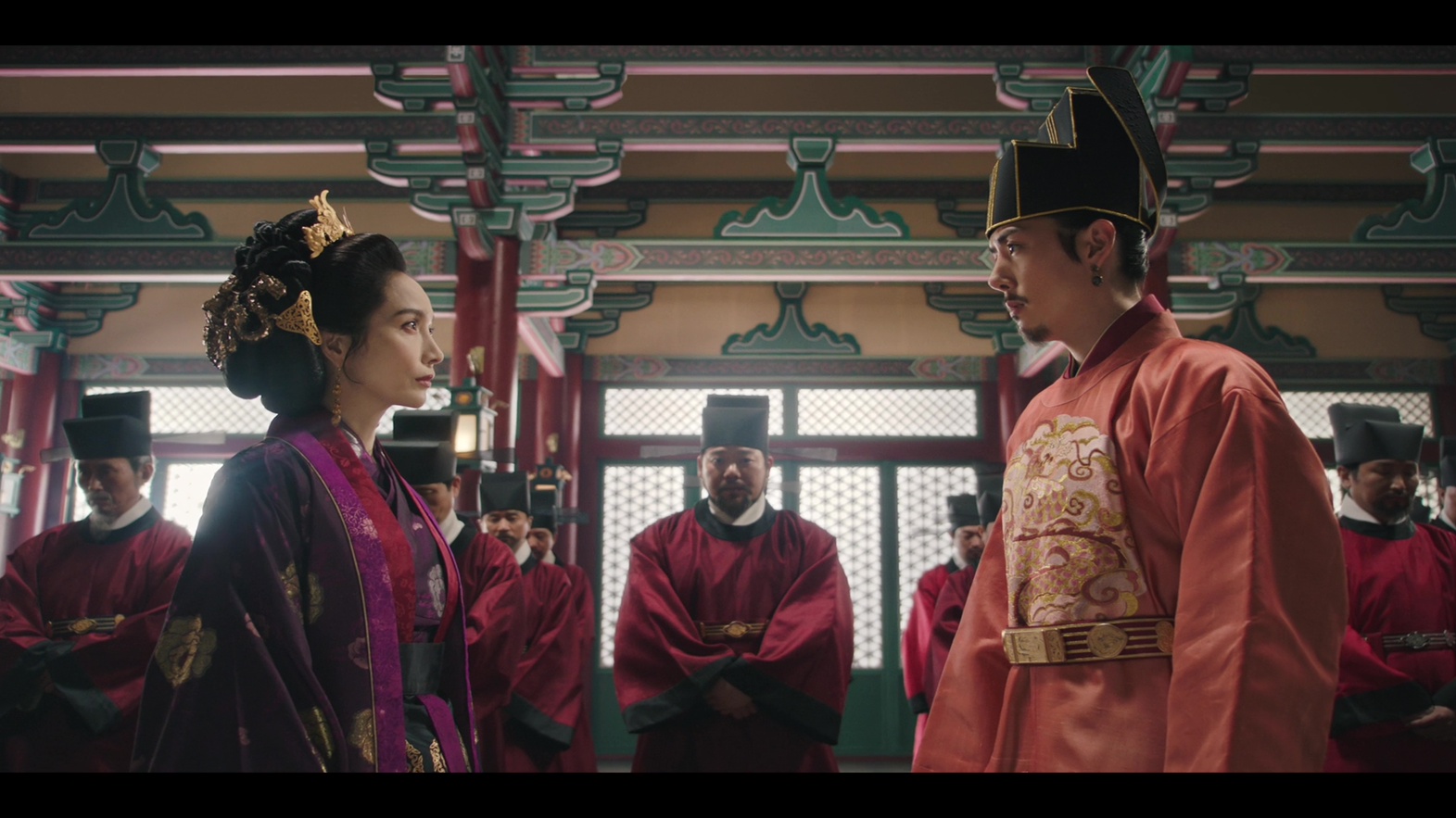
Gosh, it’s almost like she knows! Right at this moment, Prince Daeryangwon hides in a secret room beneath the floorboards of the monastery — as, above him, the dowager queen’s messenger sits stony-eyed. She has brought the prince a generous gift: an entire spread of totally-not-poisoned food. The stalemate can’t last forever. Tapping the floor, she realizes it is hollow. Moments later, the hidden trapdoor is released — and the prince blinks up at her, hopelessly trapped.
All in all, a mixed beginning for me! I do enjoy this drama’s lush, grand ambitions — both in terms of its history-spanning plot, and its intricate aesthetic. This show is luxuriating in being a Goryeo drama specifically, and in covering more ground than your average Joseon fusion. I can so get behind that. On that note, I love that we’re starting with one of our heroes, Prince Daeryangwon, so young and powerless. There’s plenty of room for growth. He can be thoughtless and bratty, and his actions have unintended consequences for those around him — which are all fun points, in my book! I love it when historical dramas make their kings-in-the-making work for their character development, and face up to their mistakes.
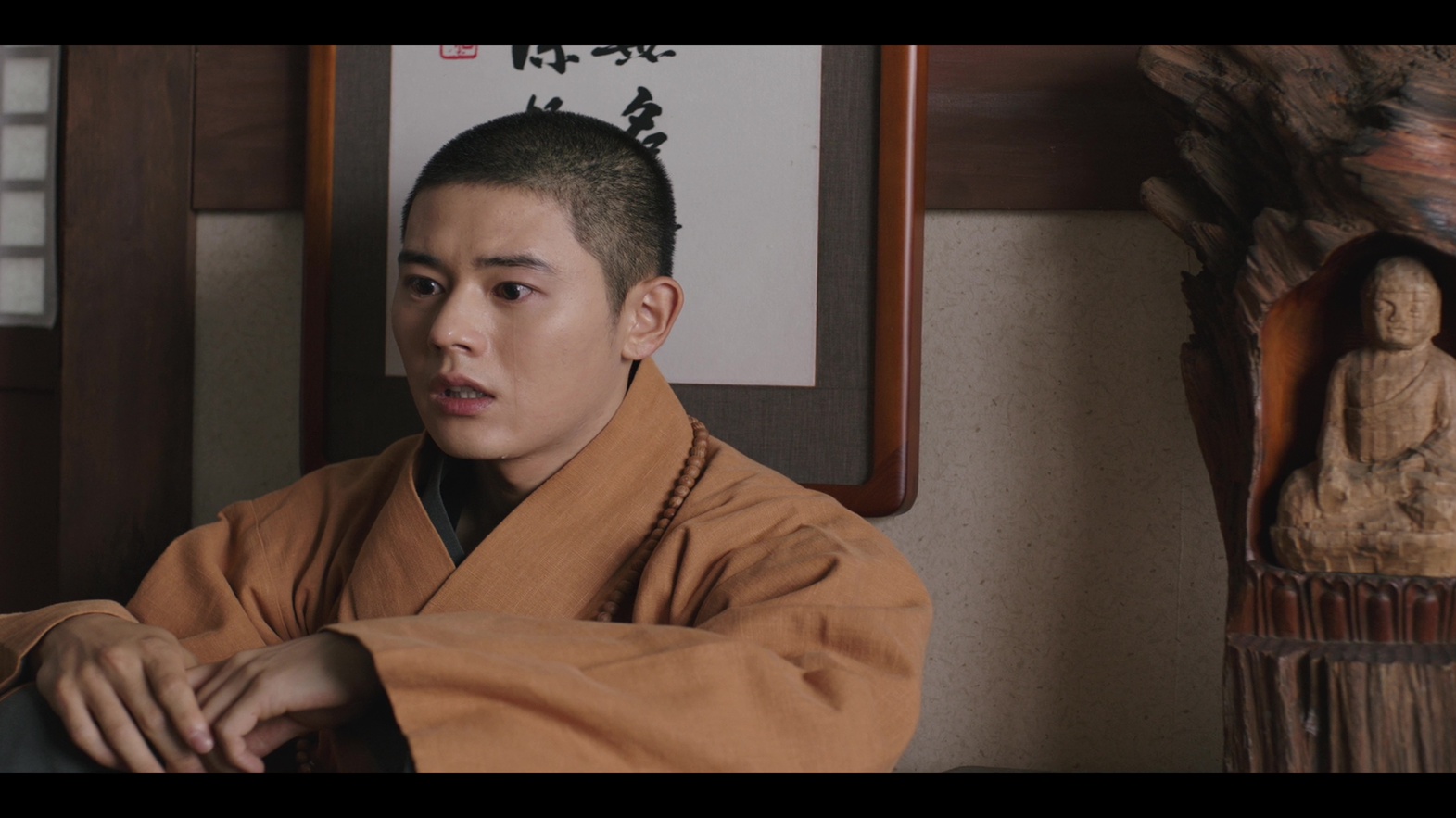
My quibble is with how this show presents King Mokjong — there are too many tiresome tropes at play. Queerness becomes the signifier of decadent elitism. Our king’s lover may well be manipulating him. His unsuitability to rule is implicitly linked to his sexuality, whilst juxtaposed with the soldiers’ traditional masculinity and competence. That said, Baek Sung-hyun’s acting is engaging, and whilst I suspect King Mokjong will be a short-lived player in what’s to come, he makes me feel for him with his self-awareness, audacity, and flashes of kindness.
As for Dowager Queen Cheonchu… whilst she very much is a trope, I can’t deny that I enjoy a murderous, machiavellian villain. Again, the acting is spot on. The most memorable part of this episode was the messy battle of wills between mother and son. However, that plotline definitely benefits from the backdrop of imminent war: on the one hand, you get all the claustrophobic backstabbing and schemes, but you’re constantly reminded that soon the outside world will burst in. The building blocks of this drama are pretty recognizable — you have your exiled heir, your scheming queen, your heroic resistance in the face of invasion — but there’s plenty of room for them to expand beyond that. Above all, it’s this show’s potential that intrigues me. After all, who can resist an epic?

RELATED POSTS
[ad_2]
Source link

